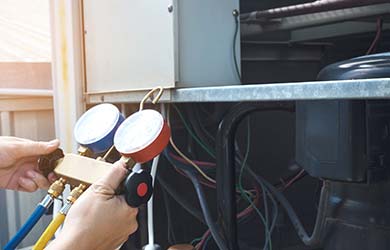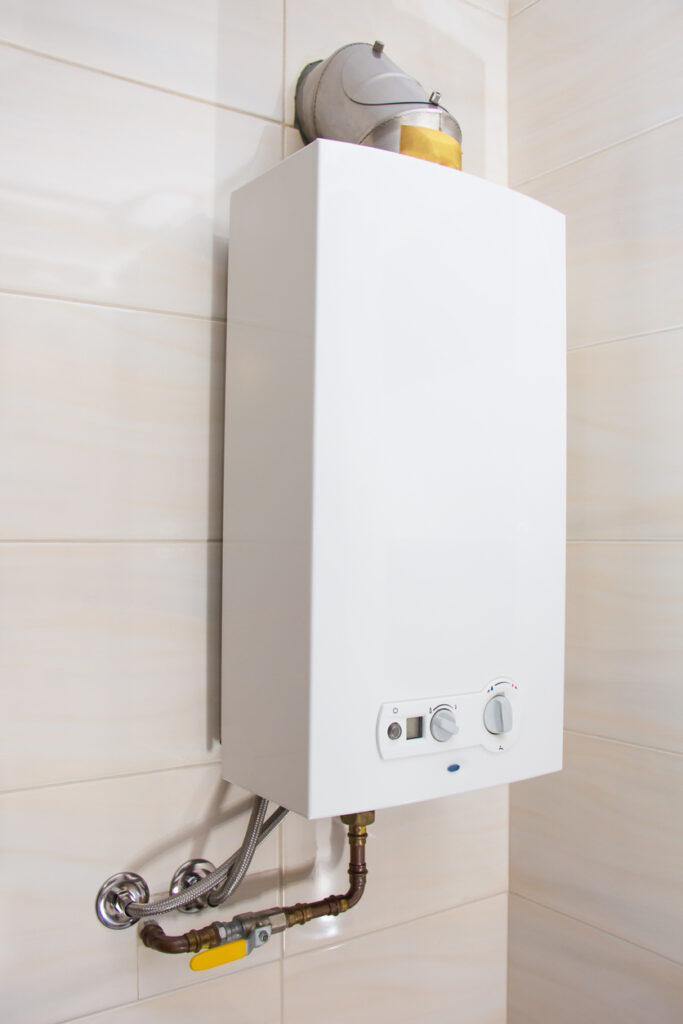When the hotter months start rolling in, your air conditioner is the part of your home you’d want the most to run smoothly. Ironically, the heat of the summer and the heavy work your AC needs to do may just cause your precious unit to break down when you need it the most.
Your AC is made up of many different parts that act together to cool your home. When there’s a problem, any one of these parts breaking can be the culprit.
If your air conditioner breaks down, don’t feel too overwhelmed. It’s not always a big and costly problem. You may just have a faulty capacitor, which can be easily replaced and won’t cause any other problems as long as you act quickly.
First, let’s find out more about capacitors and the reasons why they can break down.
What is an AC capacitor?
A capacitor is a cylindrical device that provides your AC motor with the initial burst of energy it needs to start. It’s similar to a rechargeable battery but doesn’t work exactly the same way. It stores energy so that it can start your AC and provide a continuous charge to keep it running. It takes a lot of energy to start and sustain a machine as large as an air conditioning unit. It can be a lot for your home’s electrical system, that’s why a capacitor is necessary.
There are two types of air conditioner capacitors:
- Start capacitors
Start capacitors provide that jolt of electricity that kick-starts the fan motor and the compressor. Once the AC is up and running, the start capacitor is no longer needed.
- Run capacitors
After the air conditioner starts working, the run capacitor is used to maintain a charge so that the machine can keep running.
What can cause capacitors to fail?
An air conditioner capacitor can fail for many reasons. Capacitors are electrical devices that handle huge amounts of electricity to power your device. Naturally, they can experience a lot of wear and tear due to many factors. Here are the most common reasons why capacitors fail:
- Excess heat exposure
Capacitors are sensitive to heat. If your AC is constantly exposed to direct heat or sunlight, its capacitor may become damaged. Running your unit to the point of overheating is also one way for the capacitor to sustain damage.
- Wrong voltage rating
Replacing your AC capacitor with something that has a lower voltage rating can cause problems. The capacitor can bloat, leak, and break down.
- Physical damage
Debris inside or around the machine can cause damage to the capacitor and cause it to leak and fail.
- Electrical damage
Power surges, lightning, and other electrical fluctuations can damage your air conditioner’s capacitor.
- Wear and tear
Sometimes, normal wear and tear could be the problem. Capacitors are built to last a long time, but many factors can lessen this lifespan. For instance, if your AC is constantly exposed to heat and isn’t maintained regularly, your AC capacitor can give out earlier than expected.
What happens when your AC’s capacitor fails?
There are many ways to determine if your AC capacitor is having problems. Although some symptoms are not exclusive to capacitor failure, it’s still worth considering when you encounter issues. Here are some symptoms you need to watch out for:
- Your AC is not cooling your home
If you notice that your air conditioner is not cooling your home even though it’s been running continuously, your unit may have a damaged capacitor. Many reasons could lead to cooling problems. However, if you’re sure that your AC is clean and maintained but it’s still not blowing cold air, this may be a sign that it’s a capacitor issue.
- Delayed cooling
If it takes longer than normal for your AC to cool your home, it may be because your AC is not getting enough power to do so.
- Humming or clicking noises
Hearing noises from your machine is always a cause for concern. If you hear humming or clicking noises from your AC, it may be a sign of a capacitor issue.
- High electricity bills
You can get higher electricity bills when your AC capacitor is broken because the machine is working twice as hard to provide cool air for your home.
- Sudden shut-downs
If your air conditioner suddenly turns off on its own, it may be caused by a capacitor failing to keep a continuous flow of electricity in your machine.
- Problems with AC turning on
The capacitor is necessary to jump-start the AC. If your air conditioner doesn’t start right away or at all, this is a telltale sign that the capacitor is broken.
- Burning smell
If there is a burning smell coming from your outside unit, this is a sign that your AC is straining itself and is overheating. If the burning smell has a chemical tinge to it, the capacitor may be leaking, and you should turn off your AC right away and have the part replaced.
What to do if you think your AC capacitor has failed
If your air conditioner won’t turn on, chances are, you’ll get right up and call a technician. However, if your AC’s problems are not yet that severe, you can be tempted to put it off for another day. You may think that the problem isn’t that big of a deal, but it could be if left unchecked.
Don’t ignore the problem. A broken capacitor can damage the rest of your unit. It’s a simple fix that can be done quickly, so there’s no need to delay and let the issue lead to more damage.
If you’re still not convinced that it’s the capacitor that’s causing your unit’s malfunctions, here are some ways you can know for sure:
- Do a visual check
Open your machine’s outside unit according to the manufacturer’s instructions. Typically, you can do this by using a screwdriver to remove the side panel. Once you have opened your machine, check if the capacitor is bloated or leaking. Do not touch the capacitor. It is dangerous and can seriously harm you. If you see telltale signs of damage, it’s time to call a licensed technician to replace the capacitor.
- Test your AC capacitor
If you’re the DIY type, you can discharge your AC capacitor and then use a multimeter to see if it’s working. Match your multimeter readings to the range of numbers written on the capacitor’s body. If your reading is outside the range, then you need to replace the capacitor.
If you’re not experienced with HVAC maintenance and repairs, do not replace your unit’s capacitor. Doing so can be dangerous not just to your health, but also to your AC system.
Even though the capacitor is no longer connected to the AC, it still holds some electricity. The remaining charge in the capacitor may electrocute you, and if it is leaking, the chemicals may harm your health.
It’s recommended that you call professional HVAC technicians to do it for you. It’s the safest way to get this relatively simple procedure done so that you can have your AC up and running in no time.
Regular Maintenance
A regular AC capacitor can last around 10-20 years if taken care of properly. Although the capacitor is not necessarily a fragile part, you can still do your part to prolong its life.
One way to prolong the capacitor’s life is to lessen its exposure to heat. If you can position something near your outside unit to block sunlight, that can extend the capacitor’s life. Constant maintenance can also prevent dirt buildup that can cause overheating.
Another way is to lessen your air conditioner’s workload. During very hot months, resist the temptation to drastically lower your AC’s temperature, and don’t let it run for long periods.
It’s also important to always clean your AC to get rid of any debris that can physically damage the capacitor.
Finally, you can install an HVAC surge protector to avoid electrical damage brought about by storms, lightning, or regular power surges.
Mac 5 Expert Home Services
If you suspect that your AC capacitor needs replacement, don’t hesitate to call a licensed technician to come and help you. We provide expert air conditioning repair services in Melbourne, Florida.
If you notice any problems with your air conditioning unit or simply want to schedule maintenance, we can provide you with a wide array of services to meet all your needs.
Call us now at 321-244-7500.
You can also book an appointment online, and we will contact you as soon as we can.







